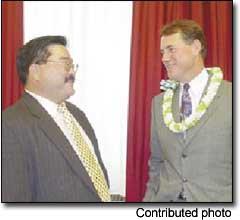Scot Tsuchiyama didn’t fully understand the significance of the 2005 Dora Maxwell Social Responsibility Award until after he accepted it on behalf of the Kekaha Federal Credit Union members and staff. When the manager and treasurer of the Kekaha Federal
Scot Tsuchiyama didn’t fully understand the significance of the 2005 Dora Maxwell Social Responsibility Award until after he accepted it on behalf of the Kekaha Federal Credit Union members and staff.
When the manager and treasurer of the Kekaha Federal Credit Union began talking about and showing the award to others, the import of the award began to set in.
“I didn’t know it was such an honor” until he began talking about the award with leaders of other credit unions in Washington, D.C., and one other credit union leader told him he had been trying to win the award for 10 years.
He also downplayed the role Kekaha Federal Credit Union (KFCU) leaders have in providing incentives to Kekaha School students in certain programs established at the school, especially since officials with huge Mainland credit unions establish foundations and give millions of dollars in grants to needy area residents there.
“We just try to do our little part out here in Kekaha,” said Tsuchiyama, even arguing that he didn’t think the winning of the award warranted front-page coverage in The Garden Island.
Tsuchiyama accepted the award for KFCU members’ and staff’s involvement in an educational program that’s being credited for helping Kekaha School students to achieve passing levels on state standardized tests during the last two consecutive testing periods.
The MAX (Maximum Communication Journal) program began in January 2004 when KFCU leaders initiated a partnership with Kekaha School Principal Billi Smith.
The program requires students to keep journals of class activities and homework, including notes and notices from teachers and other school leaders.
Each student is required to have his or her parents or guardians read and sign the MAX notebook each week, which ensures communication among students, parents, teachers, and other school officials.
During school assemblies, KFCU leaders through the MAX program offer prizes, such as body boards, movie passes and bicycles, to students and members of the class with the highest percentages of completed and signed MAX notebooks.
“The celebration assemblies are fun and crazy. Parents are invited to attend, and the kids are happy and excited,” said Smith, who is now a state Department of Education Westside complex educational specialist.
Tsuchiyama said the MAX program continues, and the KFCU involvement has expanded to other programs at the school as well.
“Hopefully we can keep the kids learning, catch they while they’re young, and instill good learning habits with them,” he said.
Kekaha School serves a largely-low-income community of 3,700 residents who include Native Hawaiian, Ni’ihau natives and members of immigrant families.
Eleven percent of the school’s students speak English as a second language, and 62 percent qualify for free or reduced-priced lunches as a result of their family incomes.
United States Rep. Ed Case, D-Neighbor Islands-rural O’ahu, said in a press release that the special project partnering the employees of KFCU and students of Kekaha School will now serve as a national model for outstanding social responsibility and academic achievement.
Dora Maxwell is recognized as one of the original pioneers of the credit-union movement. The award that bears her name was created to promote social responsibility among credit-union leaders by formally recognizing and celebrating their social achievements.
Tsuchiyama accepted for other KFCU members and staff, in the asset category of between $10 million and $20 million, he said.
“The partnership between the two produced the Maximum Communication Journal program, or MAX program, which has encouraged Kekaha Elementary’s students to pursue daily excellence in the class work and homework while also involving parents in their children’s work,” said Case in remarks submitted into the Congressional Record.
“The MAX program has achieved its goals of attracting an 80-percent participation rate by students over four semesters and, more importantly, helping students achieve state-standardized-testing benchmarks,” Case added.
Chartered in 1938 to serve the employees of the Kekaha Sugar Company, the Kekaha Federal Credit Union has 1,500 members from across the island.
Officials at KFCU also work at a community development credit union, catering to the financial needs of low-income individuals.
Kekaha FCU’s members are among over 700,000 credit union members statewide.
“I want to recognize and commend Kekaha Federal Credit Union not only for sponsoring this important and innovative program, but for receiving this national recognition by the Credit Union National Association,” Case added.
“This award is just another example of the great work and strong personal relationships that our credit unions provide their respective communities, and represents a perfect union of the very best of credit unions and community service,” said Case.
Case recently met with representatives of Hawai’i’s credit unions to discuss pending issues of importance to officials and members of Hawai’i’s credit unions.
Case is an original co-sponsor of H.R. 2317, the Credit Union Regulatory Improvements Act.
Supported by leaders of the Hawaii Credit Union League and Credit Union National Association, the bill would improve the regulatory environment for the nation’s credit unions, and allow them to better serve the nation’s communities, Case concluded.


